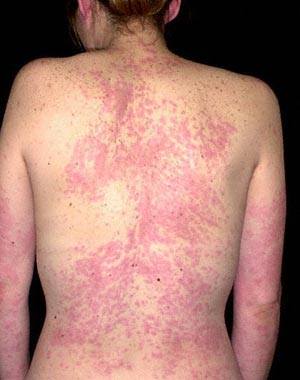 A study by researchers at the University of Nebraska Medical Center shows vitamin D as an add-on therapy could provide some relief for chronic hives, a condition with no cure and few treatment options. An allergic skin condition, chronic hives create red, itchy welts on the skin and sometimes swelling. They can occur daily and last longer than six weeks, even years.
A study by researchers at the University of Nebraska Medical Center shows vitamin D as an add-on therapy could provide some relief for chronic hives, a condition with no cure and few treatment options. An allergic skin condition, chronic hives create red, itchy welts on the skin and sometimes swelling. They can occur daily and last longer than six weeks, even years.
Jill Poole, M.D., associate professor in the UNMC Department of Internal Medicine, was principal investigator of a study in the Feb. 7 edition of the Annals of Allergy, Asthma and Immunology. The two-year study looked at the role of over-the-counter vitamin D3 as a supplemental treatment for chronic hives.
Over 12 weeks, 38 study participants daily took a triple-drug combination of allergy medications (one prescription and two over-the-counter drugs) and one vitamin D3, an over-the-counter supplement. Half of the patient’s took 600 IUs of vitamin D3 and the other half took 4000 IUs.
Researchers found after just one week, the severity of patients’ symptoms decreased by 33 percent for both groups. But at the end of three months, the group taking 4000 IUs of vitamin D3 had a further 40 percent decrease in severity of their hives. The low vitamin D3 treatment group had no further improvement after the first week.
“We consider the results in patients a significant improvement,” Dr. Poole said. “This higher dosing of readily available vitamin D3 shows promise without adverse effects. Vitamin D3 could be considered a safe and potentially beneficial therapy.
“It was not a cure, but it showed benefit when added to anti-allergy medications. Patients taking the higher dose had less severe hives — they didn’t have as many hives and had a decrease in the number of days a week they had hives.
In the study, patients had suffered from five to 20 years with severe hives. Some had been on therapy and others none.
The cause of hives is not generally known, but allergy and autoimmune reactions sometimes play a role. Treatment options for chronic hives are limited.
“Standard therapy is to control symptoms with antihistamines and other allergy medications,” Dr. Poole said. “Some are costly and can pose substantial side effects.”
She said the study didn’t include patients with kidney disease or those with calcium disorders.
Source: Andy Rorie, Whitney S. Goldner, Elizabeth Lyden, Jill A. Poole. Beneficial role for supplemental vitamin D3 treatment in chronic urticaria: a randomized study. Annals of Allergy, Asthma & Immunology, 2014; DOI: 10.1016/j.anai.2014.01.010














